Antwerp Uncovered
The Complete Expat Guide
If you’re considering a move to Antwerp, you’ll quickly discover why this Belgian port city captivates both locals and newcomers. Beyond its diamond district and medieval charm, Antwerp offers a unique blend of historic elegance and modern urban living. While the city’s advantages are numerous, from excellent public transport to vibrant cultural scenes, it is crucial to understand both the perks and challenges before making your decision.
The Cost of Living & Housing Market in Antwerp
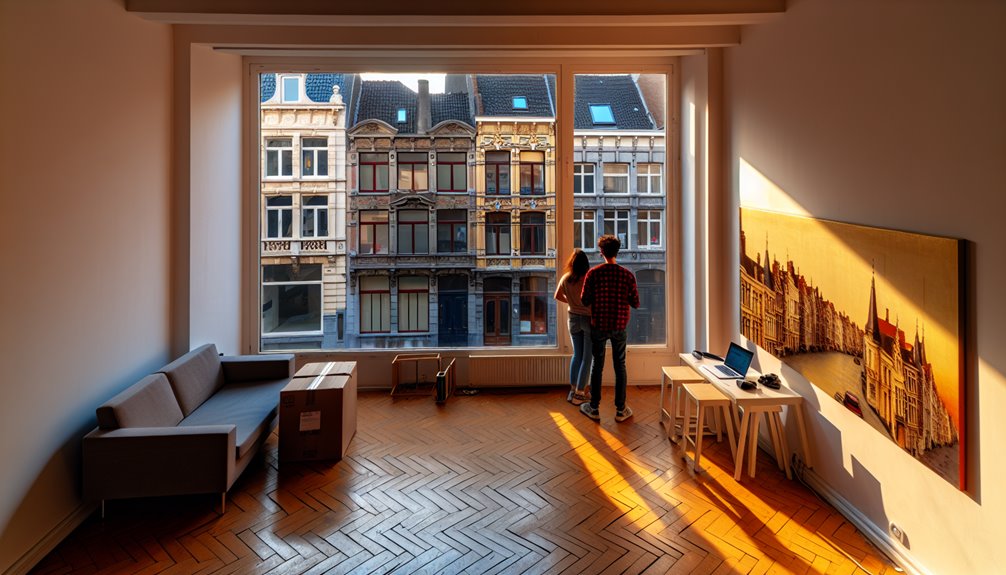 You’ll find that Antwerp’s monthly living expenses run about 25% lower than those in Brussels, with a single person needing roughly €1,500 for basics like food, utilities, and transportation.
You’ll find that Antwerp’s monthly living expenses run about 25% lower than those in Brussels, with a single person needing roughly €1,500 for basics like food, utilities, and transportation.
When it comes to housing costs, you’re looking at average apartment rental prices of €800-1,200 per month in the city center, while purchase prices have steadily increased by 3-4% annually over the past five years.
The real estate market remains competitive, especially in desirable districts like Zuid and Zurenborg, where property values continue to appreciate faster than the city average.
Monthly Living Expenses
Living expenses in Antwerp typically fall into three main categories: housing, daily necessities, and transportation.
For a single person, you’ll need about €850-1,200 monthly for a one-bedroom apartment, while utilities add another €150-200. Daily necessities, including groceries and basic household items, cost around €300-400 per month.
Transportation costs vary based on your preferences. A monthly public transit pass runs about €49, while maintaining a car costs considerably more due to fuel prices, insurance, and parking fees.
You’ll also want to budget €100-150 for internet and mobile phone services, plus €150-200 for entertainment and dining out.
Real Estate Price Trends
While monthly expenses give a snapshot of day-to-day costs, Antwerp’s real estate market tells a broader story about long-term investment and housing affordability.
You’ll find property prices have steadily increased by 3-4% annually since 2015, with the city center and Zuid district experiencing the highest appreciation rates.
The average price for a two-bedroom apartment in central Antwerp currently stands at €275,000, while similar properties in suburban areas like Deurne or Merksem cost around €220,000.
Historic properties in prestigious neighborhoods like Zurenborg can command prices exceeding €500,000.
If you’re looking to invest, emerging districts like Het Eilandje and the newly developed Nieuw Zuid offer modern apartments with strong potential for value growth, thanks to ongoing urban development projects and improved infrastructure.
Transportation & Getting Around the City
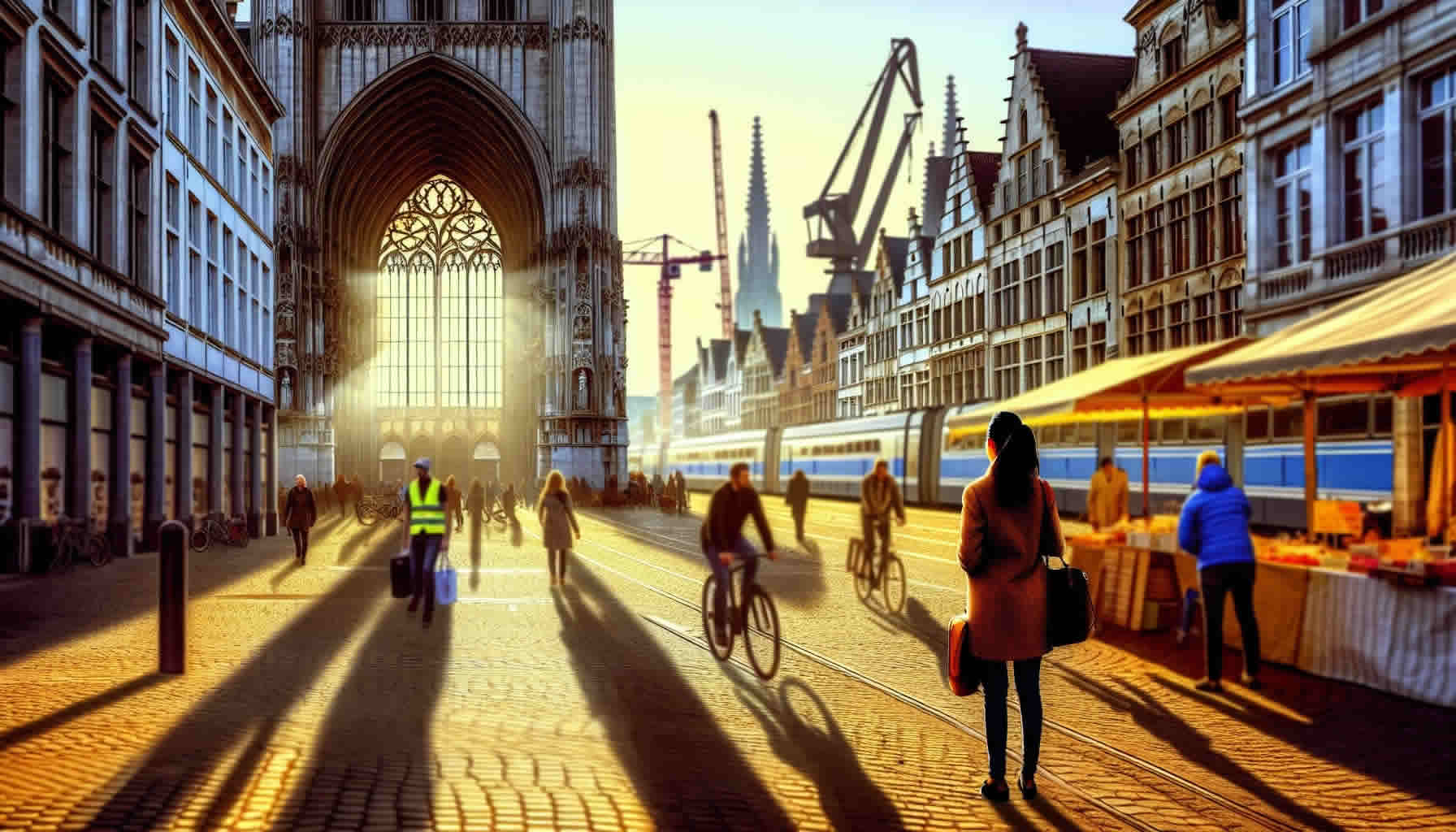 Antwerp’s extensive public transit system of trams, buses, and pre-metro lines makes traversing the city straightforward and efficient for daily commutes.
Antwerp’s extensive public transit system of trams, buses, and pre-metro lines makes traversing the city straightforward and efficient for daily commutes.
You’ll find cycling is deeply embedded in the city’s culture, with dedicated bike lanes, secure parking facilities, and bike-sharing programs making two-wheeled transport a practical choice.
While cars remain an option, you’ll likely prefer the convenience of public transport or cycling, especially given the city center’s limited parking and pedestrian-friendly zones.
Public Transit Network Overview
The extensive public transit system in Antwerp makes getting around the city surprisingly easy. The network consists of buses, trams, and trains operated by De Lijn and NMBS/SNCB, covering both the city center and surrounding districts.
- Trams serve as the backbone of public transit, with 14 lines connecting major neighborhoods, shopping areas, and attractions.
- Buses complement the tram network, reaching areas where tram lines don’t operate and providing night service through specific routes.
- Pre-metro (underground tram) tunnels run beneath the city center, offering quick transit through high-traffic areas.
- Regular trains connect Antwerp to other Belgian cities and international destinations through Antwerp Central Station.
You’ll find real-time updates for all services through De Lijn’s mobile app, making journey planning straightforward and reliable.
Cycling Culture and Infrastructure
Alongside its robust public transit system, cycling stands as a major pillar of daily transportation in Antwerp. You’ll find extensive bike lanes, dedicated cycling paths, and bike-friendly infrastructure throughout the city. The flat terrain makes cycling an attractive option for both commuting and leisure.
You can easily rent bikes through the Velo Antwerpen bike-sharing system, with over 350 stations scattered across the city. Annual subscriptions are affordable, and you’ll get the first 30 minutes free with each ride.
The city’s commitment to cycling safety shows in its well-maintained paths, clear signage, and traffic signals specifically for cyclists.
When cycling in Antwerp, you’ll need to follow local traffic rules and use proper bike lights after dark. Secure bike parking facilities are available at major destinations and transport hubs.
Car Vs Alternative Transport
While owning a car in Antwerp provides flexibility, you’ll find the city’s extensive public transport and cycling infrastructure often make it unnecessary.
The city’s commitment to sustainable mobility has created efficient alternatives to driving, making car ownership more of a choice than a necessity.
- Public transport offers better value, with trams, buses, and trains connecting all districts, while parking fees and fuel costs make car ownership expensive.
- Rush hour traffic and limited parking spaces in the city center can make driving stressful and time-consuming.
- The Low Emission Zone (LEZ) restricts certain vehicles, requiring registration and potential fines for non-compliance.
- Most daily necessities are within walking or cycling distance, and you’ll find car-sharing services readily available for occasional trips outside the city.
Work Culture & Career Opportunities
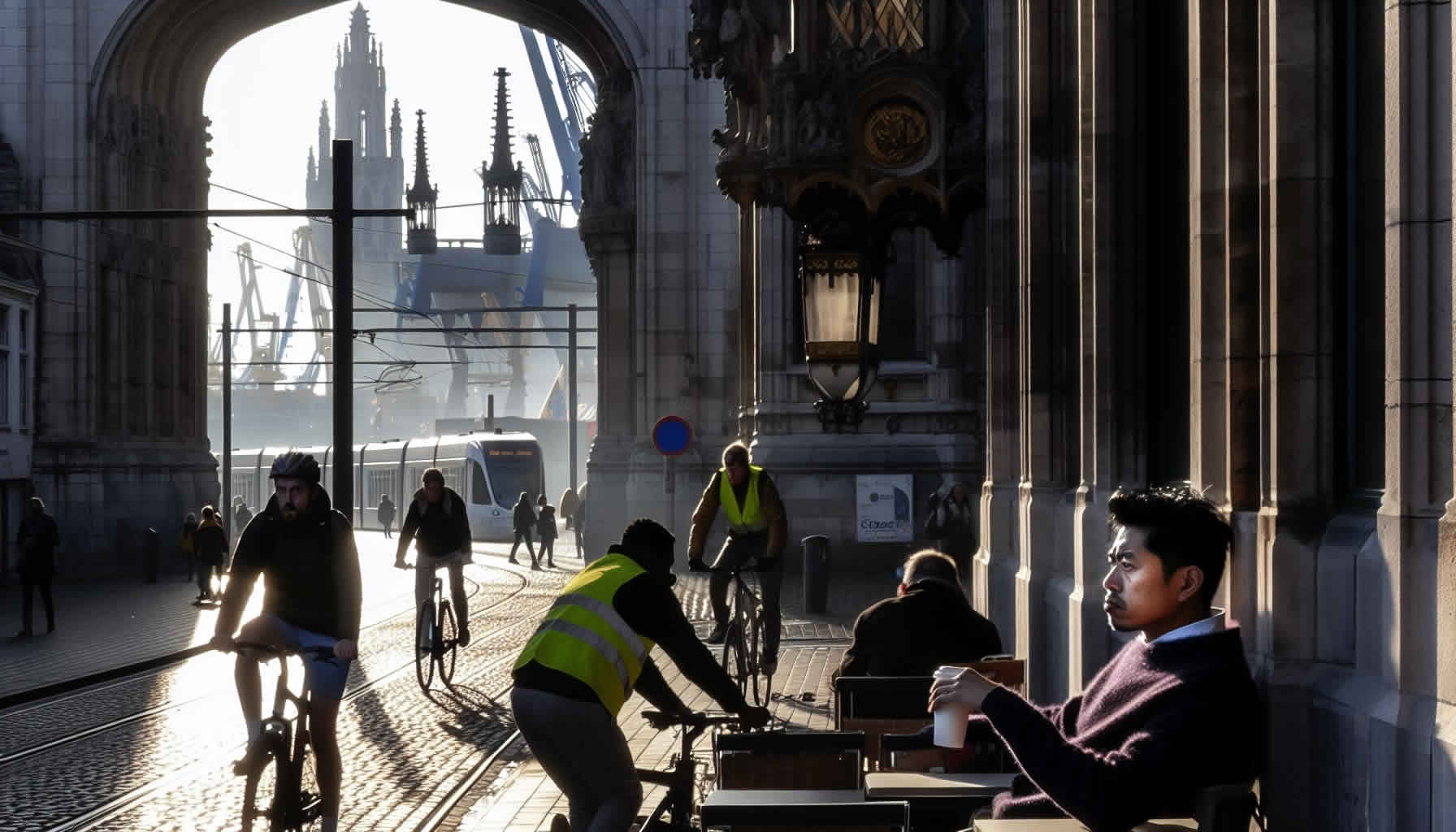 Antwerp’s robust job market centers on its port operations, diamond trade, and growing tech sector, giving you diverse career options in both local and multinational companies.
Antwerp’s robust job market centers on its port operations, diamond trade, and growing tech sector, giving you diverse career options in both local and multinational companies.
You’ll find the Belgian work culture emphasizes a healthy work-life balance, with standard 38-hour workweeks and generous vacation policies.
Your international career prospects can flourish here, as Antwerp’s position as a major European business hub attracts global talent and offers numerous opportunities for professional growth in multilingual environments.
Job Market Key Industries
The powerhouse port city’s diverse economy creates abundant career opportunities across several key industries.
As Europe’s second-largest port, Antwerp’s maritime and logistics sector remains a major employer, while its diamond trade continues to sparkle globally.
The city’s growing tech scene and established chemical industry offer promising career paths for skilled professionals.
Key industries where you’ll find job opportunities:
- Maritime & Logistics – Port operations, shipping companies, freight forwarding, and supply chain management
- Diamond Industry – Trading, cutting, polishing, and jewelry manufacturing
- Petrochemicals & Manufacturing – Chemical plants, refineries, and industrial production
- Technology & Innovation – Digital startups, IT services, software development, and fintech companies
These sectors frequently seek both local and international talent, with English often accepted as a working language alongside Dutch.
Work-Life Balance Standards
Working professionals in Antwerp enjoy one of Europe’s most balanced approaches to career and personal life.
You’ll find that most companies offer 20-25 paid vacation days annually, plus 10 public holidays. The standard workweek is 38 hours, and overtime isn’t common in Belgian work culture.
You can expect flexible work arrangements, including work-from-home options and adjustable hours, especially in international companies. Belgian law protects your right to disconnect after working hours, and employers respect family time.
The city’s compact size means you’ll spend less time commuting, giving you more leisure time.
Many companies provide additional benefits like extra parental leave, health insurance, and meal vouchers. This emphasis on work-life balance contributes to high employee satisfaction and productivity levels in Antwerp’s professional environment.
International Career Growth
Since Antwerp serves as a major European business hub, you’ll find abundant opportunities for international career growth across diverse sectors.
The city’s strategic location and multicultural environment create ideal conditions for advancing your career while gaining valuable cross-border experience.
- Major multinational companies, particularly in logistics, diamond trading, and petrochemicals, regularly seek English-speaking professionals for mid to senior-level positions.
- The Port of Antwerp offers specialized roles in maritime operations, international trade, and supply chain management.
- Tech startups and innovation hubs provide opportunities to work with cutting-edge technologies while collaborating with professionals from around the world.
- Global networking events, professional development programs, and industry conferences help you build valuable international connections and advance your career trajectory.
Food, Shopping & Entertainment Scene
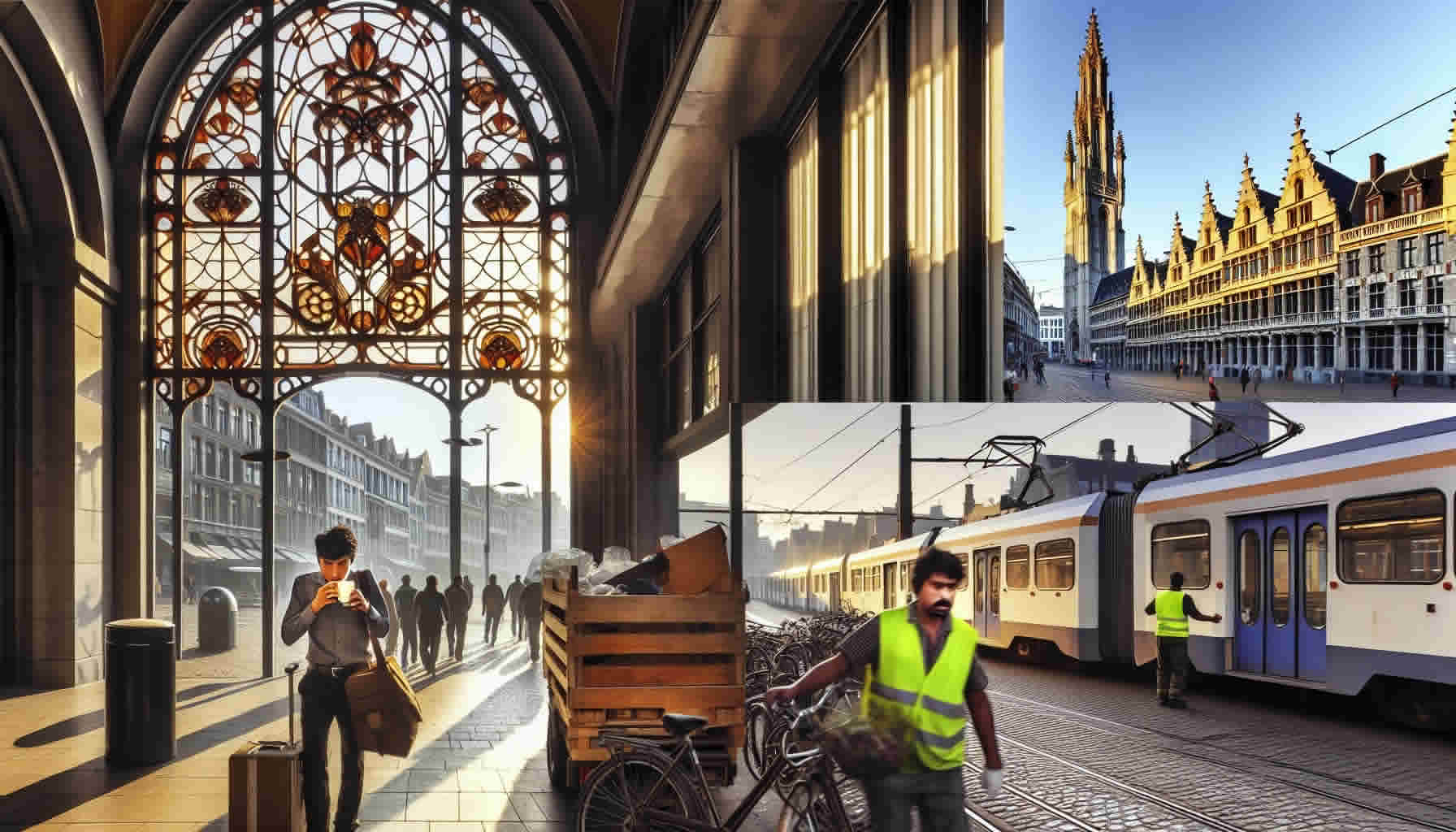 You’ll find Antwerp’s markets and food halls bursting with local flavors, from the historic Grote Markt to the trendy Mercado food court.
You’ll find Antwerp’s markets and food halls bursting with local flavors, from the historic Grote Markt to the trendy Mercado food court.
The city’s nightlife spans cozy brown cafés, modern clubs along the Schipperskwartier, and live music venues in the student district.
Throughout the year, you can join cultural festivals like the Summer of Antwerp, which transforms the city with outdoor performances, pop-up bars, and art installations.
Markets and Food Halls
Where better to experience Antwerp’s culinary scene than at its vibrant markets and food halls?
You’ll find an exciting mix of traditional Belgian delicacies and international cuisines at these bustling venues throughout the city.
- The Exotic Market on Theaterplein squares hosts vendors every Saturday, offering fresh produce, spices, and street food from around the world.
- Mercado Food Market in the historic center brings together local chefs and food artisans under one roof, perfect for casual dining and drinks.
- The Friday Market (Vrijdagmarkt) lets you browse antiques and vintage items while enjoying traditional Belgian street snacks.
- Antwerp Market Hall combines a trendy food court atmosphere with specialty shops, where you can sample everything from Belgian chocolates to Asian fusion dishes.
Nightlife and Cultural Events
When the sun sets over Antwerp, the city transforms into a vibrant hub of entertainment and cultural expression.
You’ll find an eclectic mix of venues in the Zuid district, where trendy bars and clubs cater to diverse musical tastes, from jazz to electronic dance music.
The city’s cultural calendar brims with events like the Summer Festival, Fashion Week, and the Christmas Market.
You can catch performances at the iconic Opera House or explore contemporary art exhibitions at the M HKA museum.
The historic Trix venue hosts alternative rock concerts, while the Sportpaleis attracts international pop stars.
For a more laid-back evening, you’ll discover cozy brown cafés serving Belgian beers in the old town, or join locals at outdoor terraces along the Schelde River during warmer months.
Healthcare & Education Systems
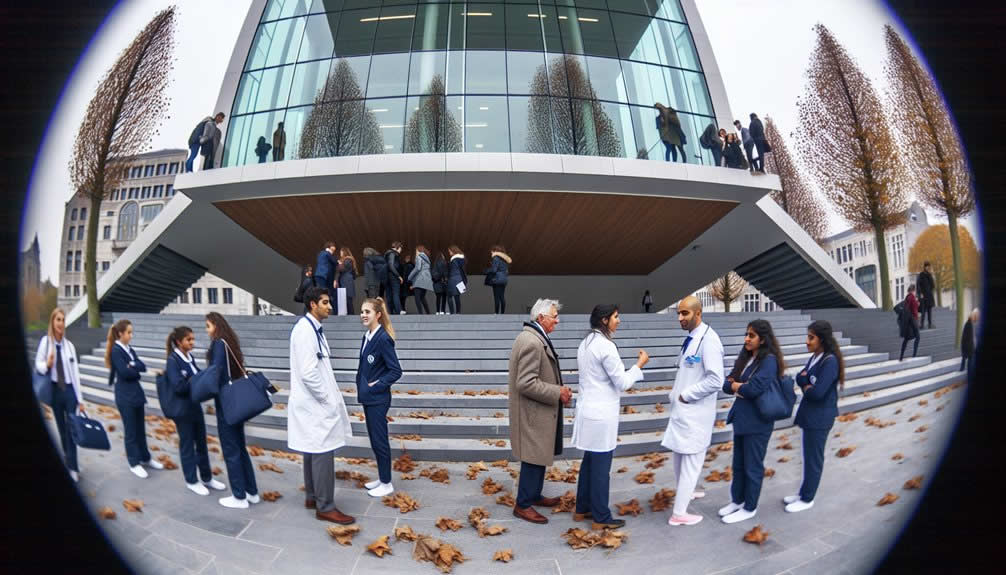 You’ll find Antwerp’s healthcare system provides extensive public coverage through Belgium’s national insurance program, which covers most medical services when you register with a local doctor.
You’ll find Antwerp’s healthcare system provides extensive public coverage through Belgium’s national insurance program, which covers most medical services when you register with a local doctor.
The city offers numerous private and public schooling options, including several well-regarded international schools that follow American, British, and European curricula.
If you’re relocating with children, you can choose from institutions like Antwerp International School and BEPS International School, which cater specifically to expat families.
Public Healthcare Coverage Details
Belgium’s public healthcare system provides extensive coverage to Antwerp residents through a combination of state insurance and private supplementary plans.
You’ll need to register with a local health insurance fund (mutuelle/ziekenfonds) to access the benefits.
Basic public coverage includes:
- Up to 75% reimbursement for doctor visits, specialist consultations, and hospital stays
- Significant subsidies for prescription medications, with some essential drugs fully covered
- Full coverage for preventive care services, including vaccinations and routine screenings
- Maternity care, including prenatal visits, delivery, and postnatal follow-ups
You’re free to choose your healthcare providers, and the system allows direct access to specialists without referrals.
Remember to keep all receipts and documentation for reimbursement claims, which you can submit through your insurance fund’s online portal.
International School Options Available
Beyond healthcare, families moving to Antwerp have access to several top-tier international schools that cater to the city’s diverse expat community.
The Antwerp International School (AIS) stands out as the most established option, offering the International Baccalaureate program from primary through high school levels. You’ll find both English and Dutch language tracks available.
For younger children, you can consider the BEPS International School Antwerp, which follows the British curriculum and serves students aged 2.5 to 12 years.
The Deutsche Schule Antwerpen provides German-language education, while the French International School of Antwerp (EFSA) offers a French curriculum.
Each school maintains high academic standards and provides extensive extracurricular activities to support your child’s development in a multicultural environment.
Start your new life smoothly — get a moving quote for Antwerp.
If you’re moving soon, our Complete Guide to Moving in Antwerp explains all practical steps you need before settling in.








